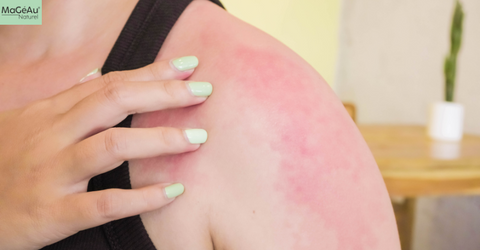Have you ever applied a skincare product only to find your skin red, itchy, or irritated? If so, you’re not alone. Many people struggle with skin reactions, but the real question is: do you have sensitive skin, or are you experiencing an allergic reaction? Understanding the difference is key to choosing the right products and avoiding discomfort.
The Struggles of Dealing with Skin Reactions
It’s frustrating when your skin reacts unpredictably. You spend money on skincare products, hoping they’ll nourish your skin, only to wake up with redness, burning, or dryness. Many people immediately assume they’re allergic to an ingredient, but that’s not always the case. Sometimes, your skin is just sensitive and needs extra care. So how can you tell what’s happening to your skin?
What is Sensitive Skin?
Sensitive skin isn’t a medical condition but a skin type. It means your skin reacts easily to external factors like weather changes, pollution, fragrances, or harsh ingredients. Some common signs of sensitive skin include:
- Redness (but no swelling or hives)
- Tightness or dryness
- A burning sensation after using certain products
- Occasional breakouts that aren’t acne
- Discomfort when exposed to extreme temperatures
Sensitive skin is often genetic, meaning you might always have to take extra care when choosing skincare products. But don’t worry, having sensitive skin doesn’t mean you can’t have healthy, glowing skin. It just means you need to use gentle, nourishing products.
What is an Allergic Reaction?
An allergic reaction is your immune system overreacting to an ingredient, treating it as a harmful substance. Unlike sensitive skin, an allergy doesn’t just cause mild irritation it can trigger a more severe response. Some common signs of a skincare allergy include:
- Swelling, hives, or blisters
- Intense itching
- Rashes that don’t go away quickly
- Peeling skin
- Difficulty breathing in extreme cases
Unlike sensitive skin, which reacts to a variety of factors, an allergy is specific to a particular ingredient. If you experience an allergic reaction, stop using the product immediately and consult a dermatologist if the symptoms persist.
How to Tell the Difference
It’s easy to confuse sensitive skin with an allergic reaction because they share symptoms like redness and irritation. However, here’s how you can tell them apart:
|
Feature |
Sensitive Skin |
Allergic Reaction |
|
Timing of Reaction |
Almost immediate or within a few hours |
Can take up to 48 hours to appear |
|
Type of Symptoms |
Redness, dryness, slight stinging |
Swelling, hives, blisters, severe itching |
|
Recovery Time |
Improves quickly with a gentle routine |
Can last for days and may require medical attention |
|
Common Triggers |
Harsh weather, fragrances, chemicals |
Specific ingredients like nuts, preservatives, or fragrance compounds |
If your skin calms down after switching to a milder product, you likely have sensitive skin. If the reaction persists or worsens, it could be an allergy.
Common Triggers You May Not Know About
Most people know that fragrances and preservatives can irritate the skin, but some lesser-known triggers might be causing your skin issues:
- Hard water – Minerals like calcium can disrupt your skin’s barrier, leading to irritation.
- Temperature changes – Sudden shifts in weather (like going from an air-conditioned room to a humid outdoors) can cause sensitive skin to flare up.
- Stress – High stress levels can weaken your skin’s protective barrier, making it more prone to reactions.
- Skincare overuse – Using too many active ingredients (like retinol and exfoliants) can strip your skin and make it more sensitive.
- Essential oils – While natural, some essential oils (like citrus and peppermint) can be irritating.
How to Care for Sensitive Skin
If you have sensitive skin, the best approach is to keep your routine simple and focus on soothing ingredients. Here’s what we recommend:
Use a gentle cleanser – Look for ingredients like magnesium, vitamin E, and beetroot extract, which help strengthen the skin barrier without stripping moisture.
Opt for a hydrating shower gel – Avoid sulphates and choose one with grape seed oil, aloe vera, and turmeric to calm inflammation and lock in moisture.
Apply a nourishing body lotion – Ingredients like shea butter, aloe vera, and magnesium help restore hydration and keep the skin supple.
Don’t forget your hands – The skin on your hands is often exposed to harsh elements, so use a hand lotion with cacao butter, aloe vera, magnesium, and vitamin E for extra protection.
Seal in hydration with a body oil – A blend of grape seed oil, magnesium, and vitamin E can help reinforce your skin’s natural barrier and prevent moisture loss.
What to Do If You Suspect an Allergy
If you think you’re allergic to a product, follow these steps:
- Stop using the product immediately.
- Wash the area with cool water and a gentle cleanser.
- Apply a soothing lotion with aloe vera or vitamin E.
- Consult a dermatologist if symptoms persist.
The Bottom Line
Sensitive skin and allergic reactions can be confusing, but understanding the difference is the first step in caring for your skin properly. If your skin is often irritated but calms down with the right products, you likely have sensitive skin. If you develop swelling, hives, or a rash that doesn’t go away, you may have an allergy and should seek medical advice.
By choosing the right skincare products with soothing and hydrating ingredients, you can avoid unnecessary reactions and keep your skin feeling comfortable and healthy. Always listen to your skin, patch-test new products, and focus on gentle, nourishing care.





Comments (0)
There are no comments for this article. Be the first one to leave a message!